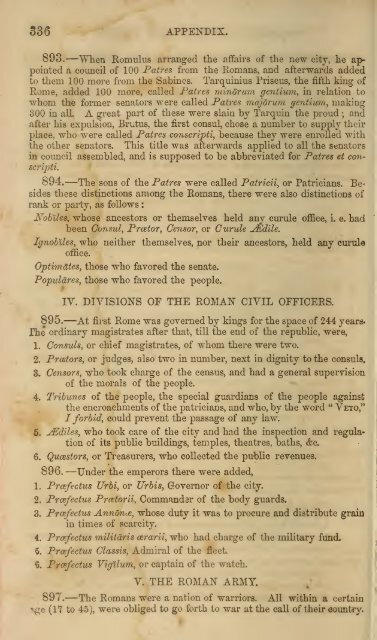The principles of Latin grammar; comprising the ... - Essan.org
The principles of Latin grammar; comprising the ... - Essan.org
The principles of Latin grammar; comprising the ... - Essan.org
- No tags were found...
Create successful ePaper yourself
Turn your PDF publications into a flip-book with our unique Google optimized e-Paper software.
:S3 6APPENDIX.893.—When Romulus arranged <strong>the</strong> affairs <strong>of</strong> <strong>the</strong> new city, he appointeda council <strong>of</strong> 100 Patres from <strong>the</strong> Romans, and afterwards addedto <strong>the</strong>m 100 more from <strong>the</strong> Sabines. Tarquinius Priscus, <strong>the</strong> fifth king <strong>of</strong>Rome, added 100 more, called Patres minorum gentium, in relation towhom <strong>the</strong> former senators were called Patres majorum gentium, making300 in all. A great part <strong>of</strong> <strong>the</strong>se were slain by Tarquin <strong>the</strong> proud ; andafter his expulsion, Brutus, <strong>the</strong> first consul, chose a number to supply <strong>the</strong>irplace, who were called Patres conscripti, because <strong>the</strong>y were enrolled with<strong>the</strong> o<strong>the</strong>r senators. This title was afterwards applied to all <strong>the</strong> senatorsin council assembled, and is supposed to be abbreviated for Patres et conscripti.894.—<strong>The</strong> sons <strong>of</strong> <strong>the</strong> Patres were called Patricii, or Patricians. Besides<strong>the</strong>se distinctions among <strong>the</strong> Romans, <strong>the</strong>re were also distinctions <strong>of</strong>rank or party, as followsA T oblles, whose ancestors or <strong>the</strong>mselves held any curule <strong>of</strong>fice, i. e. hadbeen Consul, Prwtor, Censor, or Curule uEdile.Ignobiles, who nei<strong>the</strong>r <strong>the</strong>mselves, nor <strong>the</strong>ir ancestors, held any curule<strong>of</strong>fice.Optimates, those who favored <strong>the</strong> senate.Populares, those who favored <strong>the</strong> people.IV. DIVISIONS OF THE ROMAN CIVIL OFFICERS.895.—At first Rome was governed by kings for <strong>the</strong> space <strong>of</strong> 244 years.<strong>The</strong> ordinary magistrates after that, till <strong>the</strong> end <strong>of</strong> <strong>the</strong> republic, were,1. Consuls, or chief magistrates, <strong>of</strong> whom <strong>the</strong>re were two.2. Prwtors, or judges, also two in number, next in dignity to <strong>the</strong> consuls,3. Censors, who took charge <strong>of</strong> <strong>the</strong> census, and had a general supervision<strong>of</strong> <strong>the</strong> morals <strong>of</strong> <strong>the</strong> people.4. Tribunes <strong>of</strong> <strong>the</strong> people, <strong>the</strong> special guardians <strong>of</strong> <strong>the</strong> people against<strong>the</strong> encroachments <strong>of</strong> <strong>the</strong> patricians, and who, by <strong>the</strong> word " Veto,"I forbid, could prevent <strong>the</strong> passage <strong>of</strong> any law.5. jEdiles, who took care <strong>of</strong> <strong>the</strong> city and had <strong>the</strong> inspection and regulation<strong>of</strong> its public buildings, temples, <strong>the</strong>atres, baths, &e.6. Qucestors, or Treasurers, who collected <strong>the</strong> public revenues.896. —Under <strong>the</strong> emperors <strong>the</strong>re were added,1. Prosfectus Urbi, or Urbis, Governor <strong>of</strong> <strong>the</strong> city.2. Prazfectus Prcetorii, Commander <strong>of</strong> <strong>the</strong> body guards.3. Prarfectus Annon^e, whose duty it was to procure and distribute grainin times <strong>of</strong> scarcity.4. Prazfectus militaris cerarii, who had charge <strong>of</strong> <strong>the</strong> military fund.9. Prazfectus Classis, Admiral <strong>of</strong> <strong>the</strong> fleet.$. Prcefectus Vigilum, or captain <strong>of</strong> <strong>the</strong> watch.V. THE ROMAN ARMY.897.—<strong>The</strong> Romans were a nation <strong>of</strong> warriors. All within a certain*ge (17 to 45), were obliged to go forth to war at <strong>the</strong> call <strong>of</strong> <strong>the</strong>ir country.
















